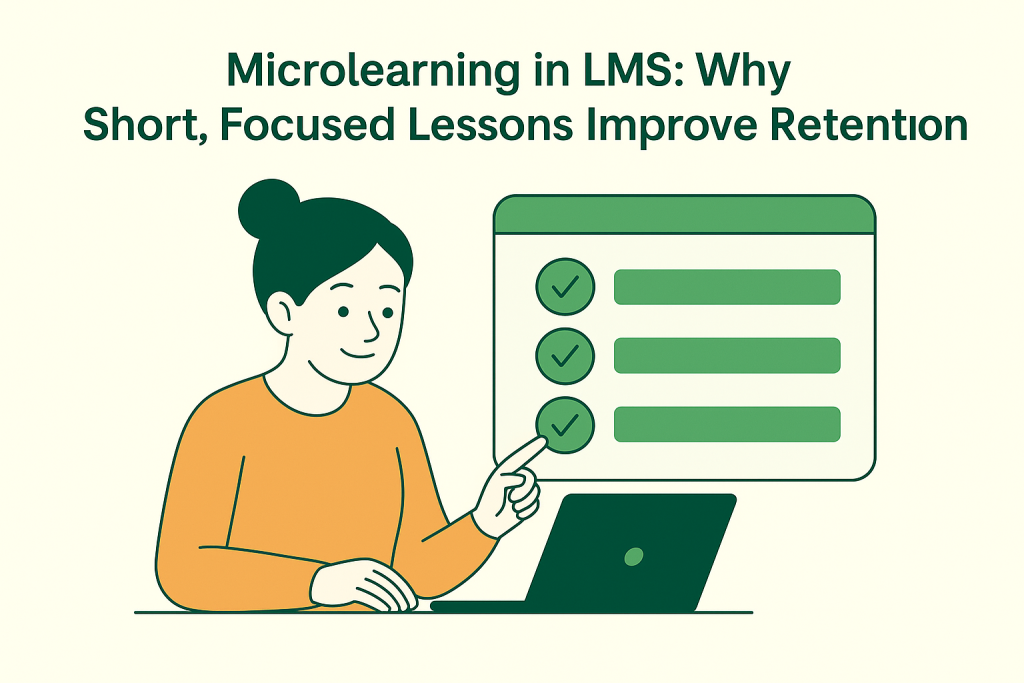Microlearning in LMS: Why Short, Focused Lessons Improve Retention

In the fast-paced world of corporate training, employees are often juggling multiple tasks, leaving little time for lengthy training sessions. As a result, many organizations are turning to microlearning as a solution to deliver effective and engaging training. Microlearning, characterized by short, focused lessons, is designed to improve knowledge retention while fitting seamlessly into employees’ busy schedules.
In this post, we’ll explore why microlearning through a Learning Management System (LMS) has become a popular approach for corporate training and how it helps boost retention and engagement.
What is Microlearning?
Microlearning is a training approach that delivers content in small, bite-sized chunks, typically lasting 3-7 minutes. These lessons focus on a single, specific topic or skill, allowing learners to quickly grasp concepts without feeling overwhelmed by information.
Microlearning can take various forms, including:
- Short videos
- Infographics
- Interactive quizzes
- Flashcards
- Quick how-to guides
- Brief case studies
This type of learning is particularly effective when integrated into a LMS, where learners can access content on-demand, at their own pace.
Why Microlearning Improves Knowledge Retention
1. Overcoming Cognitive Overload
Traditional training methods often involve long, information-heavy sessions that can overwhelm employees and lead to cognitive overload. When learners are bombarded with too much information, they struggle to retain it. Microlearning solves this problem by breaking down complex topics into smaller, digestible lessons.
Studies have shown that people retain 80% of the information they learn in short, focused bursts, compared to only 20% from longer training sessions. By delivering one concept at a time, microlearning allows learners to fully absorb and remember information.
2. Spaced Repetition for Reinforcement
Microlearning lends itself well to the spaced repetition technique, where learners revisit important concepts over time to reinforce their understanding. With an LMS, organizations can schedule microlearning lessons to be revisited at intervals, ensuring that learners remember key information for the long term.
For example, an LMS can automatically send a quiz or quick refresher lesson to employees a week after their initial training, reinforcing what they’ve learned and solidifying retention.
3. Engagement Through Interactivity
Microlearning is highly engaging because it often incorporates interactive elements such as quizzes, simulations, and video content. These activities keep learners actively involved, which increases both retention and participation.
Instead of passively consuming information, learners are prompted to apply their knowledge in real-time, helping them better understand and remember the material. LMS platforms make it easy to integrate interactive elements into microlearning modules, keeping learners engaged and motivated.
4. Fits Into Busy Schedules
One of the most significant advantages of microlearning is that it fits into employees’ busy schedules. Traditional, hour-long training sessions can be difficult to attend, especially when employees are balancing a full workload. Microlearning, on the other hand, allows employees to complete training during short breaks, commutes, or even in between tasks.
This flexibility not only makes it more likely that employees will complete their training but also helps improve retention by reducing the mental fatigue that comes with longer lessons.
The Benefits of Microlearning in an LMS
Implementing microlearning through an LMS offers several distinct advantages for both employees and organizations. Here’s why integrating microlearning into your LMS is a winning strategy:
1. On-Demand Learning
With an LMS, learners can access microlearning content whenever it’s convenient for them. Whether it’s during a break, before a meeting, or while commuting, employees can engage with training materials on their own schedule. The on-demand nature of microlearning encourages completion and provides learners with control over their learning experience.
2. Mobile-Friendly Learning
Microlearning is perfectly suited for mobile learning, allowing employees to complete lessons on their smartphones or tablets. An LMS optimized for mobile learning ensures that employees can access content anytime, anywhere, making training more accessible and increasing retention.

3. Tailored Learning Paths
Using an LMS, organizations can create personalized learning paths for each employee, delivering targeted microlearning modules based on their role, skill level, and performance. By tailoring content to individual needs, companies can ensure that learners are receiving relevant information, which boosts engagement and retention.
4. Tracking and Analytics
One of the biggest advantages of using microlearning through an LMS is the ability to track learner progress. Organizations can monitor completion rates, quiz scores, and engagement levels to see how well employees are retaining information. This data helps identify areas where additional training may be needed and provides insights into the overall effectiveness of the learning program.
5. Cost-Effective Training
Microlearning modules are quick to create and update, making them a cost-effective solution for delivering corporate training. Instead of developing long, resource-heavy courses, companies can roll out short lessons as needed. This approach is particularly beneficial for training on rapidly changing topics, such as compliance updates or new product launches.
Real-World Success: How Companies Use Microlearning to Boost Retention
Several companies have successfully integrated microlearning into their LMS to improve retention and overall training effectiveness. Here’s how:
- Technology Companies: To keep up with fast-evolving products, tech companies use microlearning to deliver quick updates on new features or software releases. Employees can stay informed without the need for lengthy, in-depth training sessions.
- Retail Industry: Retailers use microlearning to train employees on product knowledge, customer service tips, and safety protocols. Short modules delivered on mobile devices ensure that retail staff can access training while on the floor, making learning more practical and immediately applicable.
- Healthcare Sector: Healthcare organizations use microlearning for compliance training and continuing education. Short lessons and quizzes are ideal for busy healthcare professionals who need to stay up-to-date on best practices and regulations.
Conclusion
Incorporating microlearning into your LMS is a powerful way to improve knowledge retention, boost engagement, and provide flexible learning solutions for your employees. By delivering focused, bite-sized content, microlearning ensures that learners can absorb and retain information more effectively, all while fitting seamlessly into their daily routines.
If you’re looking to enhance your corporate training programs, consider implementing microlearning with Acadle LMS. With mobile-friendly features, personalized learning paths, and powerful tracking capabilities, Acadle ensures your employees get the most out of every lesson, leading to better learning outcomes and improved business performance.